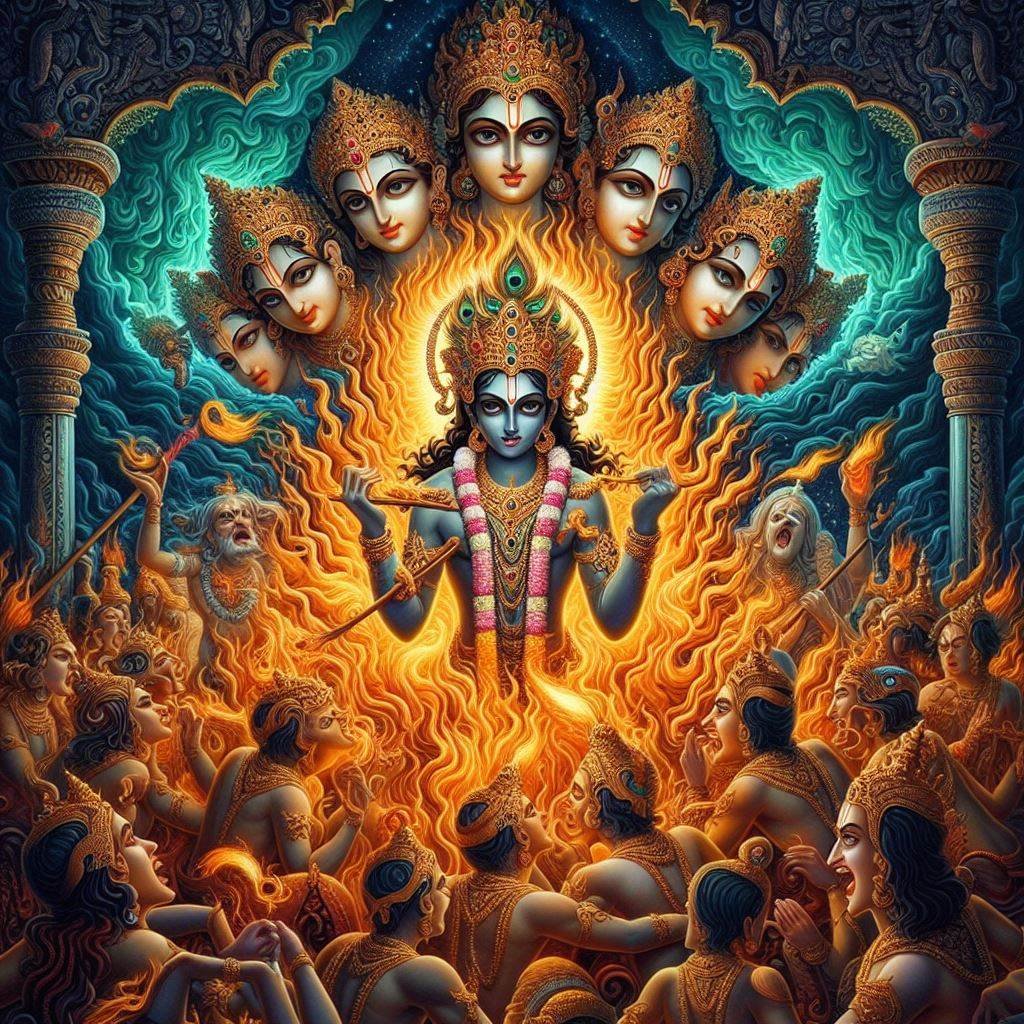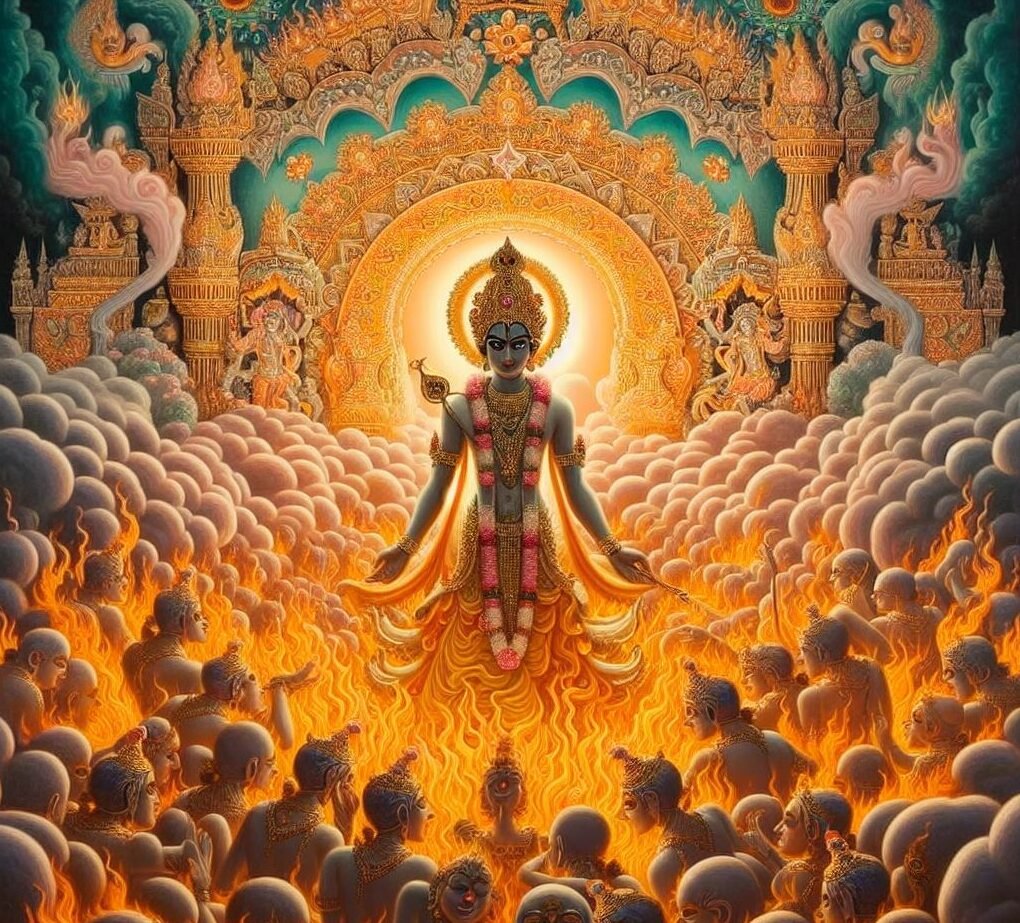Even the wisdom of the wisest is shrouded by this relentless adversary known as insatiable desire, which is akin to an unquenchable fire, constantly consuming and never satisfied, O Arjun, descendant of Kunti.
Description
In this verse, Lord Krishna vividly portrays the relentless and insatiable nature of desire, referred to as “kām” in Sanskrit. The term “duṣhpūreṇa” emphasizes its unquenchable quality, while “anala” likens it to an inexhaustible fire. Despite the wisdom of the learned, desire can overpower their discernment, leading them into its grasp. Attempts to suppress desire often prove futile, as it only intensifies its burning force. As expressed by the Buddha, desire is akin to a fire that cannot be extinguished by any amount of wealth. Recognizing desire as the source of suffering, the wise renounce it, understanding its true nature. Conversely, those who fail to grasp this truth spend their lives in futile pursuits, endlessly seeking satisfaction where none can be found.


हे कुंती के वंशज अर्जुन, यहां तक कि बुद्धिमानों की बुद्धि भी इस अथक इच्छा से घिरी रहती है, जो कभी न बुझने वाली अग्नि के समान है, जो लगातार भस्म करने वाली और कभी संतुष्ट नहीं होने वाली है।
विवरण
इस श्लोक में, भगवान कृष्ण इच्छा की अथक और अतृप्त प्रकृति को स्पष्ट रूप से चित्रित करते हैं, जिसे संस्कृत में “काम” कहा जाता है। “दुष्पुरेण” शब्द इसकी निर्विवाद गुणवत्ता पर जोर देता है, जबकि “अनला” इसकी तुलना एक अटूट अग्नि से करता है। विद्वानों की बुद्धिमत्ता के बावजूद, इच्छा उनकी समझ पर हावी हो सकती है और उन्हें अपनी चपेट में ले सकती है। इच्छा को दबाने के प्रयास अक्सर निरर्थक साबित होते हैं, क्योंकि यह केवल उसकी ज्वलंत शक्ति को तीव्र करता है। जैसा कि बुद्ध ने व्यक्त किया था, इच्छा एक आग के समान है जिसे किसी भी धन से नहीं बुझाया जा सकता है। इच्छा को दुःख का स्रोत मानकर बुद्धिमान उसके वास्तविक स्वरूप को समझकर उसका त्याग कर देते हैं। इसके विपरीत, जो लोग इस सत्य को समझने में असफल होते हैं, वे अपना जीवन निरर्थक कार्यों में बिताते हैं, अंतहीन संतुष्टि की तलाश में रहते हैं जहां कोई भी नहीं मिल सकता है।
ବୁଦ୍ଧିମାନର ଜ୍ଞାନ ମଧ୍ୟ ଏହି ନିରନ୍ତର ଶତ୍ରୁ ଦ୍ୱାରା ଆଚ୍ଛାଦିତ, ଯାହା ଅବିସ୍ମରଣୀୟ ଇଚ୍ଛା ଭାବରେ ଜଣାଶୁଣା, ଯାହା ଏକ ଅବିସ୍ମରଣୀୟ ଅଗ୍ନି ସଦୃଶ, କ୍ରମାଗତ ଭାବରେ ଗ୍ରାସ କରେ ଏବଂ କେବେ ସନ୍ତୁଷ୍ଟ ହୁଏ ନାହିଁ, ହେ ଅର୍ଜୁନ, କୁନ୍ତୀର ବଂଶଧର |
ବର୍ଣ୍ଣନା
ଏହି ପଦରେ ଭଗବାନ କୃଷ୍ଣ ଇଚ୍ଛାର ନିରନ୍ତର ତଥା ଅସନ୍ତୁଷ୍ଟ ପ୍ରକୃତିକୁ ସ୍ପଷ୍ଟ ଭାବରେ ଚିତ୍ରଣ କରିଛନ୍ତି, ଯାହାକୁ ସଂସ୍କୃତରେ “kām” କୁହାଯାଏ | ଶବ୍ଦ “duṣhpūreṇa” ଏହାର ଅବିସ୍ମରଣୀୟ ଗୁଣକୁ ଗୁରୁତ୍ୱ ଦେଉଥିବାବେଳେ “ଆନାଲା” ଏହାକୁ ଏକ ଅବିସ୍ମରଣୀୟ ଅଗ୍ନି ସହିତ ତୁଳନା କରେ | ଶିକ୍ଷିତମାନଙ୍କ ଜ୍ଞାନ ସତ୍ତ୍ desire େ, ଇଚ୍ଛା ସେମାନଙ୍କର ଚତୁରତାକୁ ଅତିକ୍ରମ କରିପାରେ, ଯାହା ସେମାନଙ୍କୁ ନିଜ ଆଡକୁ ନେଇପାରେ | ଇଚ୍ଛାକୁ ଦମନ କରିବାର ପ୍ରୟାସ ଅନେକ ସମୟରେ ବୃଥା ପ୍ରମାଣ କରେ, କାରଣ ଏହା କେବଳ ଏହାର ଜ୍ୱଳନ୍ତ ଶକ୍ତିକୁ ତୀବ୍ର କରିଥାଏ | ବୁଦ୍ଧଙ୍କ ଦ୍ୱାରା ପ୍ରକାଶିତ ଯେ, ଇଚ୍ଛା ଏକ ଅଗ୍ନି ସହିତ ସମାନ ଅଟେ ଯାହା କ amount ଣସି ପରିମାଣର ଧନ ଦ୍ୱାରା ଲିଭାଯାଇପାରିବ ନାହିଁ | ଇଚ୍ଛାକୁ ଦୁ suffering ଖର ଉତ୍ସ ଭାବରେ ଚିହ୍ନି, ଜ୍ଞାନୀମାନେ ଏହାର ତ୍ୟାଗ କରି ଏହାର ପ୍ରକୃତ ପ୍ରକୃତି ବୁ understanding ନ୍ତି | ଅପରପକ୍ଷେ, ଯେଉଁମାନେ ଏହି ସତ୍ୟକୁ ବୁ to ିବାରେ ବିଫଳ ହୁଅନ୍ତି, ସେମାନେ ନିଜ ଜୀବନକୁ ନିରର୍ଥକ କାର୍ଯ୍ୟରେ ବିତାଇଥାନ୍ତି, ଅନନ୍ତ ସନ୍ତୁଷ୍ଟତା ଖୋଜନ୍ତି ଯେଉଁଠାରେ କାହାକୁ ମିଳିବ ନାହିଁ |
